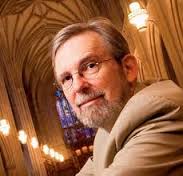STARTING POINT—
I take it as a given that you have clearly shown in this book that the narrative logic of all four Gospels is that Jesus is a part of the divine identity, and thus that strictly speaking there is no ‘low-Christology’ to use an old phrase, in any of them, if we take the collective witness of each whole Gospel on its own merits. This a fair summary of one of your major thrusts in the book, right?
***Basically right. But it could be misleading to say there is no “low Christology.” I do note that each of the four Gospels narrates the humanity, as well as the divinity, of Jesus. Consequently, the dichotomy between high and low Christology is an oversimplification. See my point 9 on pp. 107-08.
THIS LEADS TO THE FOLLOWING QUESTIONS—
1) In your introduction, you say that Reading Backwards is a sort of ‘downpayment’ or first installment or precursor to a larger study which might be called ‘Echoes of Scripture in the Gospels. Why has the use of the OT in the NT been such an important part of your scholarly work? Put another way, what so fascinated you about this subject that it became a major focus in your writings on the NT throughout your career?
***It’s something I arrived at inductively. More than 30 years ago, as a young assistant professor at Yale Divinity School, I was teaching an Intermediate Greek class, and I decided it would be pedagogically interesting to have students read NT passages that cited the OT, alongside the LXX versions of the relevant OT texts. The complexity of the NT’s appropriations and transformations of the OT fascinated me, and I started following the threads. Over time, however, I have come more and more to appreciate how much is at stake theologically in grasping the complex coherence of the canon of Scripture, OT and NT together.
2) When scholars like John Goldingay accuse Christians, even Christian scholars of ‘over-reading’ the OT, or doing eisegesis rather than exegesis of the OT, how do you respond?
***I would tell them to read my book! The fact is that the NT authors are doing precisely the kind of reading of which these scholars disapprove. So the objection that this sort of reading is illegitimate would have the effect of disowning the hermeneutical position of the NT writers. In light of texts like Luke 24:25-27 or John 5:46, it is difficult to see how a Christian scholar could take the view that the OT shouldn’t be read christologically. (Of course, the objection has a different force coming from a Jewish scholar or an agnostic.) To offer a slightly different response to this question, I would also say that my emphasis on “figural reading” opens up this question in a different way. The kind of Christological reading done by the NT authors is, on the whole, retrospective and transformational. It doesn’t rest on literalistic claims about authorial intentionality; rather, it proposes to re-read Israel’s Scripture as mysteriously given by God to prefigure events that can be understood only after the later events that correspond to them.













